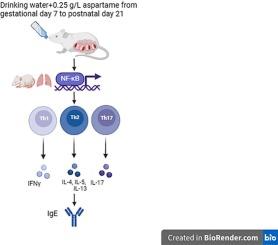母体阿斯巴甜暴露通过活化核因子-κB改变子代肺Th1/Th2细胞因子平衡。
IF 4.7
2区 医学
Q2 IMMUNOLOGY
引用次数: 0
摘要
背景:流行病学证据表明,母亲摄入非营养性甜味剂与儿童早期哮喘发病率呈正相关。我们研究了孕期和哺乳期母体接触阿斯巴甜对后代肺Th1/Th2细胞因子平衡和肠道微生物群的影响,并探讨了这些影响的中介机制:在妊娠第 7 天将妊娠 BALB/c 小鼠随机分为两个饮食干预组:对照组(仅饮用水)和阿斯巴甜组(饮用水 +0.25 g/L 阿斯巴甜)。母鼠哺育后代 3 周。在出生后第 21 天,采集心血样本并测量免疫球蛋白 E 水平。采用不依赖培养的方法采集下胃肠道微生物样本。采集肺组织进行生化分析:结果:母体接触阿斯巴甜会增加母体从妊娠第 7 天到产后第 21 天的体重,以及子代从出生到产后第 21 天的体重。母体接触阿斯巴甜后,子代肺组织中的Th2细胞因子(白细胞介素[IL]-4、IL-5和IL-13)、IL-17和免疫球蛋白E的水平明显升高,但Th1细胞因子(干扰素-γ)的水平却有所降低。Th1/Th2平衡的改变伴随着肺核因子-κB活化的增加。后代肠道微生物群的细菌组成和α-多样性在对照组和阿斯巴甜组之间没有显著差异:我们的研究结果表明,母体接触阿斯巴甜会通过激活核因子-κB影响后代肺部Th1/Th2细胞因子平衡。本文章由计算机程序翻译,如有差异,请以英文原文为准。

Maternal aspartame exposure alters lung Th1/Th2 cytokine balance in offspring through nuclear factor-κB activation
Background
Epidemiological evidence suggests that maternal intake of nonnutritive sweeteners is positively associated with early childhood asthma incidence. We investigated the effects of maternal aspartame exposure during pregnancy and lactation on lung Th1/Th2 cytokine balance and intestinal microbiota in offspring and explored the mechanisms that mediate these effects.
Method
Pregnant BALB/c mice were randomly divided on gestational day 7 into two dietary intervention groups: control (drinking water only) and aspartame (drinking water +0.25 g/L aspartame) groups. The dams nursed their offspring for 3 weeks. On postnatal day 21, heart blood samples were collected, and immunoglobulin E levels were measured. Microorganisms from the lower gastrointestinal tract were sampled using a culture-independent approach. Lung tissues were harvested for biochemical analyses.
Results
Maternal aspartame exposure increased the body weight of the dams from gestational day 7 to postnatal day 21 and the body weight of the offspring from birth to postnatal day 21. Maternal aspartame exposure significantly increased the levels of Th2 cytokines (interleukin [IL]-4, IL-5, and IL-13) and IL-17 and immunoglobulin E but reduced that of a Th1 cytokine (interferon-γ) in the offspring’s lung tissues. The altered Th1/Th2 balance was accompanied by increased lung nuclear factor-κB activation. The bacterial composition and alpha-diversity of the gut microbiota of the offspring did not differ significantly between the control and aspartame groups.
Conclusion
Our findings suggest maternal aspartame exposure influences lung Th1/Th2 cytokine balance in offspring through nuclear factor-κB activation.
求助全文
通过发布文献求助,成功后即可免费获取论文全文。
去求助
来源期刊
CiteScore
8.40
自引率
3.60%
发文量
935
审稿时长
53 days
期刊介绍:
International Immunopharmacology is the primary vehicle for the publication of original research papers pertinent to the overlapping areas of immunology, pharmacology, cytokine biology, immunotherapy, immunopathology and immunotoxicology. Review articles that encompass these subjects are also welcome.
The subject material appropriate for submission includes:
• Clinical studies employing immunotherapy of any type including the use of: bacterial and chemical agents; thymic hormones, interferon, lymphokines, etc., in transplantation and diseases such as cancer, immunodeficiency, chronic infection and allergic, inflammatory or autoimmune disorders.
• Studies on the mechanisms of action of these agents for specific parameters of immune competence as well as the overall clinical state.
• Pre-clinical animal studies and in vitro studies on mechanisms of action with immunopotentiators, immunomodulators, immunoadjuvants and other pharmacological agents active on cells participating in immune or allergic responses.
• Pharmacological compounds, microbial products and toxicological agents that affect the lymphoid system, and their mechanisms of action.
• Agents that activate genes or modify transcription and translation within the immune response.
• Substances activated, generated, or released through immunologic or related pathways that are pharmacologically active.
• Production, function and regulation of cytokines and their receptors.
• Classical pharmacological studies on the effects of chemokines and bioactive factors released during immunological reactions.

 求助内容:
求助内容: 应助结果提醒方式:
应助结果提醒方式:


